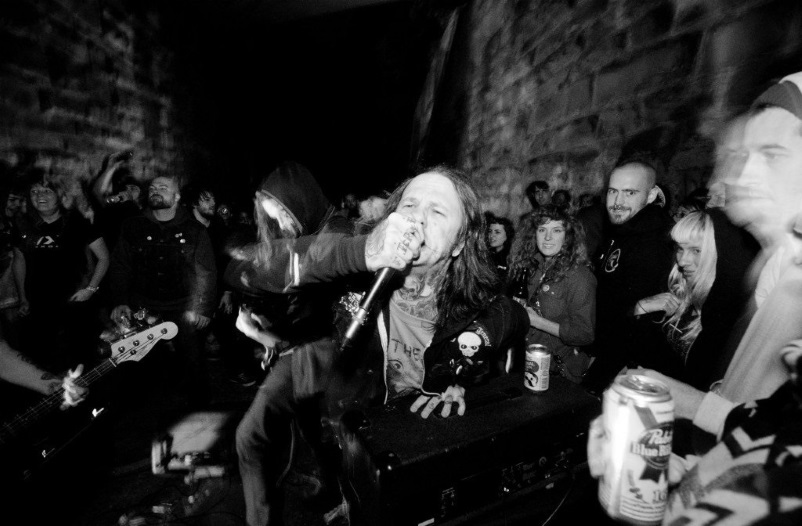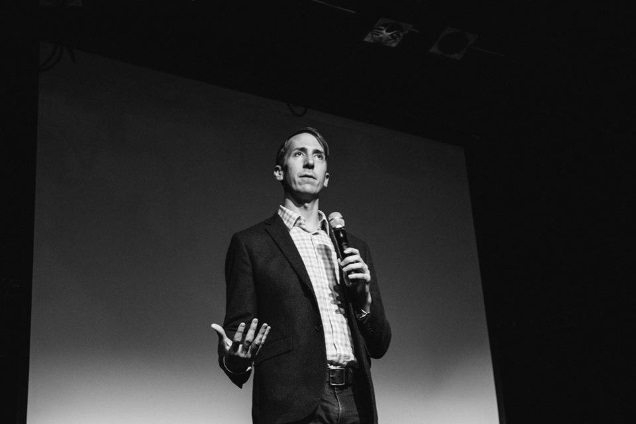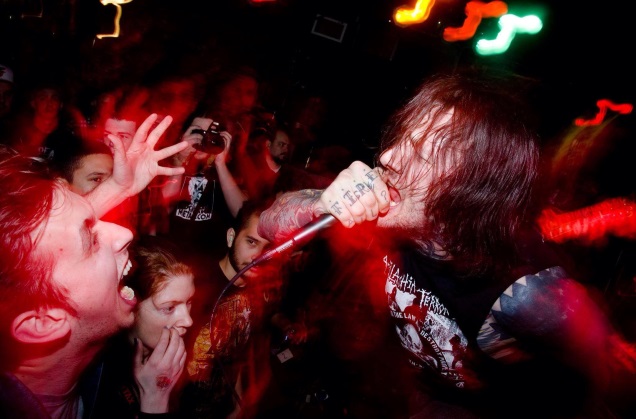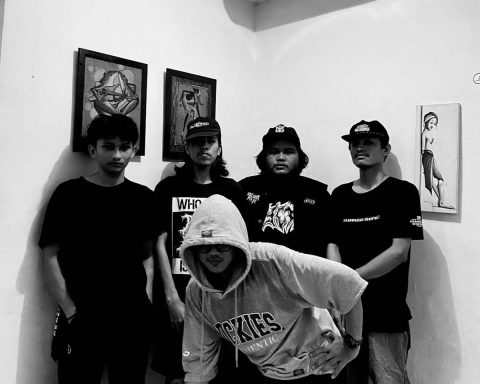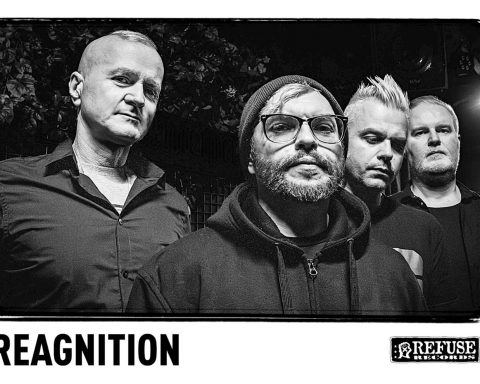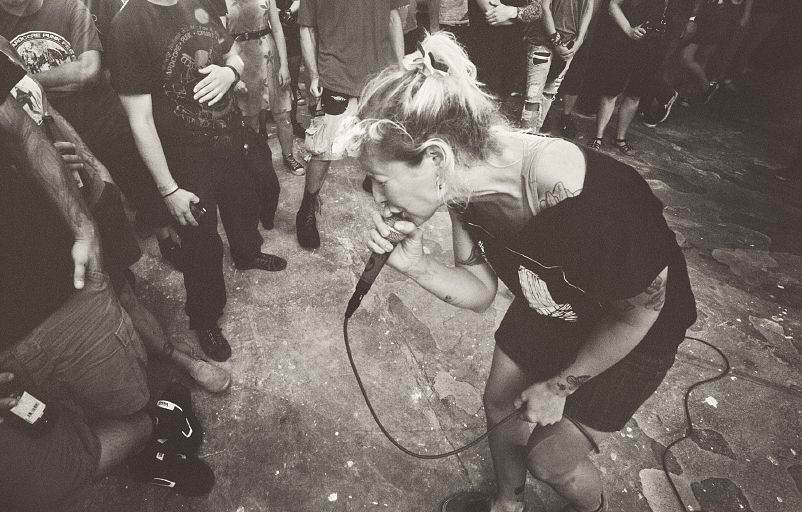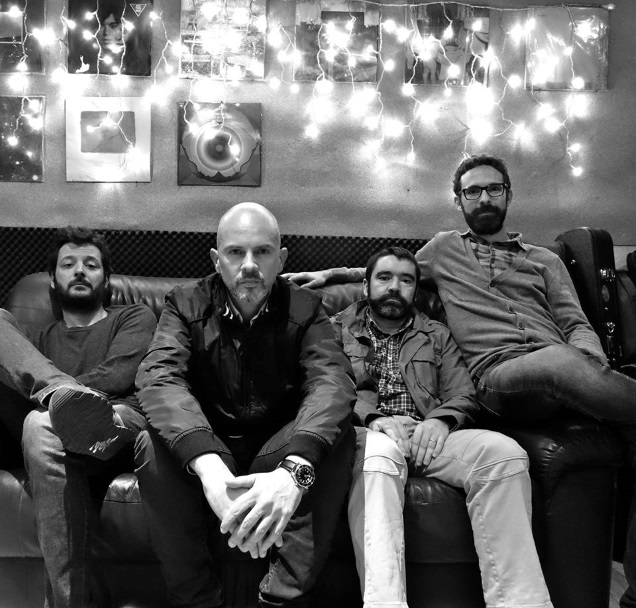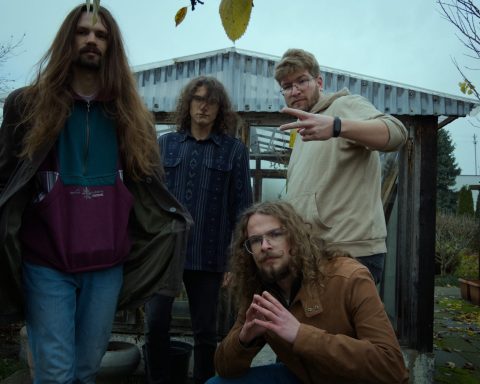Uncompromising lyricism and investigative nature of punk rock and hardcore punk has always been among the first to comment on the injustices of society, posing as one of the most direct, counterculture, angry, but also political and highly educational forms of arts. The recent record from Baltimore metallic hardcore band OLD LINES and acclaimed social activist and author Will Potter does just that. I sat down with the band’s Mitch Roemer (previously of PULLING TEETH and RUINER) and Will to unveil more details on their collaboration, and learn more about the government surveillance, social vulnerability, our fundamental rights, the political influence of punk, and more.
The U.S. has been maestros of conducting surveillance of its citizens since the early days of the country, and the ability to spy in the digitilized world we live in has dramatically improved in the last couple of decades and have intensified our fears about the years to come. Will Potter‘s work and his recent collaboration with OLD LINES released by Life Advice Records, examines the issue of surveillance and data mining and grapples with these problems. Hopefully as more and more serious issues return to out webzine and we turn to more serious conversations, inspiring personas like Mitch and Will will keep you engaged and calling on your friends to go beyond music, educate and debate on what matters, and get involved. Read the full interview below and be sure to browse through IDIOTEQ pages to find more inspiring thoughts from Greg Bennick of TRIAL, Daniel Albaigh of DIE YOUNG, punk activist Rich Stremme, Washington, D.C.’s FREE CHILDREN OF EARTH, feminist post hardcore band PETROL GIRLS, political irish punk BURNCHURCH, and more!
Live photos by Josh Sisk. Interview conducted over the course of the warmer months of this year.
Hey there guys! Thanks so much for taking some time with IDIOTEQ. How are you? How have this Spring and Summer been treating you so far?
Thanks for having me! I’m as good as I can be, spring and summer so far have been absurdly busy with band, label, professional life and of course personal life.
Yeah, let’s dive into it, starting with your latest EP release. Were you both engaged in selecting specific pieces of his talks for this release? How was this collaboration arranged?
Yes, Will wrote his spoken word tracks to fit with our lyrics and match the tone of our songs. After we got our music arranged and recorded, Will and our singer Matt went into the studio together with Kevin Bernsten (Developng Nations Studios) to iron out Will’s ideas and figure out how to make everything flow together as a cohesive record all the way down to the track titles. Will put it best, “at every step we wanted to merge our work.” I personally didn’t know what to expect since we have never gotten a chance to work on a project like this before, but I think it turned out great and getting a chance to work with someone like Will who totally went out on a limb to work with OLD LINES was incredibly refreshing.
Will: I had worked on spoken word pieces before, but never on a project that was so collaborative from the start. Having the freedom and space to work in this way was exciting, and also a bit overwhelming! It really pushed me to be more creative and personal in how I approached my tracks, and to think of them as something more than a stand-alone speech, which I had never done before. I feel really fortunate that we were all pretty much on the same page from the start, because it let all of us think about the details of the project in a more specific way.
No doubt. You have incorporated an interesting set of thoughts here. What are some of the most important social issues that you have chosen to address this time through your release and why?
The record is more about people’s general complicity in losing their fundamental rights, and how confusing and frustrating it to see so many issues get forsaken in the name of making life more convenient.
Side A deals directly in terms of FBI monitoring, data mining through social media, and the news media’s role of spinning it all to make it go down easier.
Side B is more pointed internally at the depression and hopelessness that comes from being aware of the state of our society and not feeling like you have support or that anyone else even cares. It’s like a cry for help in the times when we have to battle nihilism and remind ourselves that we have to keep pushing for something better especially when we feel most like giving up.
Regarding issues addressed on side A, how thoroughly threatening are these facts toward regular citizens?
Will: We’ve all heard the line, “if you haven’t done anything wrong you shouldn’t have anything to hide,” or some variation of it. That rhetoric has been pretty successful at convincing people that only terrorists and criminals should care about their privacy. The truth is that this widespread surveillance affects all of us. These tactics are most pervasive against marginalized communities, particularly Muslim communities and people with dissident political movements, like Black Lives Matter. But the nature of government and corporate surveillance today is that it’s not targeted, it’s sweeping; it’s the government vacuuming up as much data as possible and then looking for something in that data to justify the surveillance.
Photo by Colette-Yasi Naraghi, Seattle Social Justice Film Festival.
Can we even ascertain how the American surveillance state actually functions? How do we know which actions of the citizens it targets and what sources of personal communication it analyzes?
Will: Yes and no. The whistleblowing of Edward Snowden and others have given us a better idea of the scope of government surveillance, which is staggering. It’s clear that the government has completely shifted from a surveillance model that was, historically, used to target individuals suspected of criminal activity, to a model that is based on a presumption of guilt. In other words, it’s a shift from following leads and then using surveillance, to using surveillance and then hoping for leads. In addition to programs like PRISM and Bullrun, the Patriot Act loosened restrictions on the use of National Security Letters, which are nearly always approved by federal judges to authorize wiretaps and surveillance.
On top of all this, we’ve seen that corporations are engaging in their own “Black Ops” surveillance, and the scope of that is poorly understood, because there are even fewer checks and balances on corporate espionage as compared to government surveillance.
In general, though, it’s clear that the people most at risk of this widespread surveillance are dissident groups (and dissident journalists) and immigrant populations, particularly Muslim communities.
Having said that, would you say there’s no reason to trust the government not to spy on citizens for unlawful reasons?
Will: Both based on historical patterns and on the contemporary revelations of government surveillance, I think it’s very safe to say exactly that. In saying so, I don’t intend to instill paranoia or anything like that — I think it’s important to simply recognize that, when given expansive powers and new technology to facilitate mass surveillance, people in power have shown an inability to show restraint in the use of those invasive measures.
Why should people care about surveillance?
Will: I’m sure everyone reading this has heard the line, “If you haven’t done anything wrong, you have nothing to hide.” There’s this perception in our culture that surveillance is only something that affects criminals, spies, or “terrorists.” But it affects all of us. For me, this issue, at its core, is about the health and vitality of our democracy. Simply put, when people are being watched and scrutinized by powerful entities like the NSA and FBI, they can’t be fully comfortable and forthright in expressing their political beliefs. This widespread surveillance has what attorneys call a “chilling effect.” Meaning, it doesn’t outlaw First Amendment activity, but it chills it, because it makes us all think twice about what we’re saying or posting online. Look at this example from just the other week about a man being prosecuted for inflammatory Facebook posts about police violence. There’s no evidence of criminal intent, yet he’s facing felony “terrorist threat” charges. When we hear of stories like this, and of the NSA’s warrantless surveillance, it takes a toll on freedom of speech. We should all care about surveillance, not just because of our own personal privacy, but because it chills the vibrant and at times controversial speech that is essential in a democracy.
So what exactly should we, as internet users, do about it in order to protect ourselves better? Shall we encrypt our digital data and prvide ourselves with cryptographic privacy? Hide behind authentication for various forms of communication? How can we protect our privacy?
Will: It’s a balancing act, and a tough one at times, because most of us need to use these electronic tools, in a society increasingly dependent on them, but we also need to protect ourselves. A good starting point as folks are learning about this is a recent interview I had with Chris Soghoian of the American Civil Liberties Union for TED. Some of the easiest things everyone can do include putting a sticker over your computer’s webcam (these have been activated remotely by law enforcement), use more secure messaging platforms such as Signal, and if you frequently need to discuss sensitive matters via email, use PGP. I think the most import point for us all to remember on this topic, though, is that no communication system should be viewed as absolutely fool-proof (or NSA-proof).
Ok gentlemen, so back to your latest co-release, how do you think your music and exposing these topics through hardcore can effect some change? Will, how has been your experience and relation with heavy music and punk in particular?
Mitch: I am hoping it will help start more punk/hardcore communities become less apathetic and more socially aware of what is actually happening around us from the fucked up things that the government does to “secure our country,” to the mental and physical health of our closest friends. I am hoping for more inclusiveness, quality dialogue, critical thinking and problem solving instead of immediately running people out of a show because someone might have a different understanding of an issue that they don’t get. It’s incredibly ironic to me because punk and hardcore was supposed to be the place for the weirdos and freaks who feel rejected and didn’t belong anywhere to create their own spaces for art, music, community events and figure out how to treat each other with respect, tolerance and understanding. It seems like we have been collectively veering off track but it’s starting to change bit by bit which is keeping me hopeful for the future.
Will: Punk and hardcore had a profound influence on my politics, how I view the world, and how I approach my work. Growing up in Texas, finding punk rock at an early age was truly life-changing. I was drawn to the energy—the rage—and most importantly, the politics. I would order books, magazines, and records just because they were listed in the liner notes of political punk bands like CRASS or PROPAGANDHI. As I became more immersed in “the scene,” we would table at shows with zines and political pamphlets; I was never in a band, but the DIY ethic had a lasting impact on me, and radically shaped how I went about my own independent journalism, and really my entire career.
Alright, so wrapping it up, apart from your music and writing related activities, what else do you do in terms of supporting your stance and trying to make a change? What are you plans moving forward beyond music?
Mitch: I try to start small and work my way up. I have been involved recently in some animal rescue work collectively with old lines and I am a general supporter of BARCS which is a Baltimore based non kill animal shelter that never says no. I think stuff like that matters the most, a lot of people doing small things can make a huge difference. In the future I would also like to be more involved with local animal rescues as well as environmental organizations like sea shepherd but for now I do my best by donating money whenever I can.
Will: I recently accepted a professorship at the University of Michigan, where I’m teaching investigative journalism courses, and also continuing my own research and writing. In a lot of ways, this really represents how I view my own role in trying to make a change: I’m able to have a direct influence on students, which has already proved rewarding and inspiring, and I’m also able to expand my own work to wider audiences. For instance, my last TED talk, on secret prisons for “terrorists” on U.S. soil, just hit 2 million views. Needless to say, those aren’t just punks watching the video! Like Mitch said, I think we need to mix advocacy within our own communities with work that reaches beyond them as well. There’s no shortage of conversations and debate to be had with like-minded people, but we also need to step outside of our comfort zones and try to reach people who have never even been exposed to these issues before.
Alright, I guess it serves a fine closure to oour conversation. It’s been a pleasure. Feel free to add your final words and take care. Cheers from Warsaw!
Mitch: Thanks for the support and hopefully Old Lines gets over to Europe sooner than later!
OLD LINES Bandcamp
OLD LINES Facebook
OLD LINES Twitter
[email protected]
Will Potter official website
Will Potter Twitter
Will Potter Facebook
Will Potter’s Green Is The New Red
[email protected]
Will Potter Twitter
Will Potter Facebook
Will Potter’s Green Is The New Red
[email protected]



